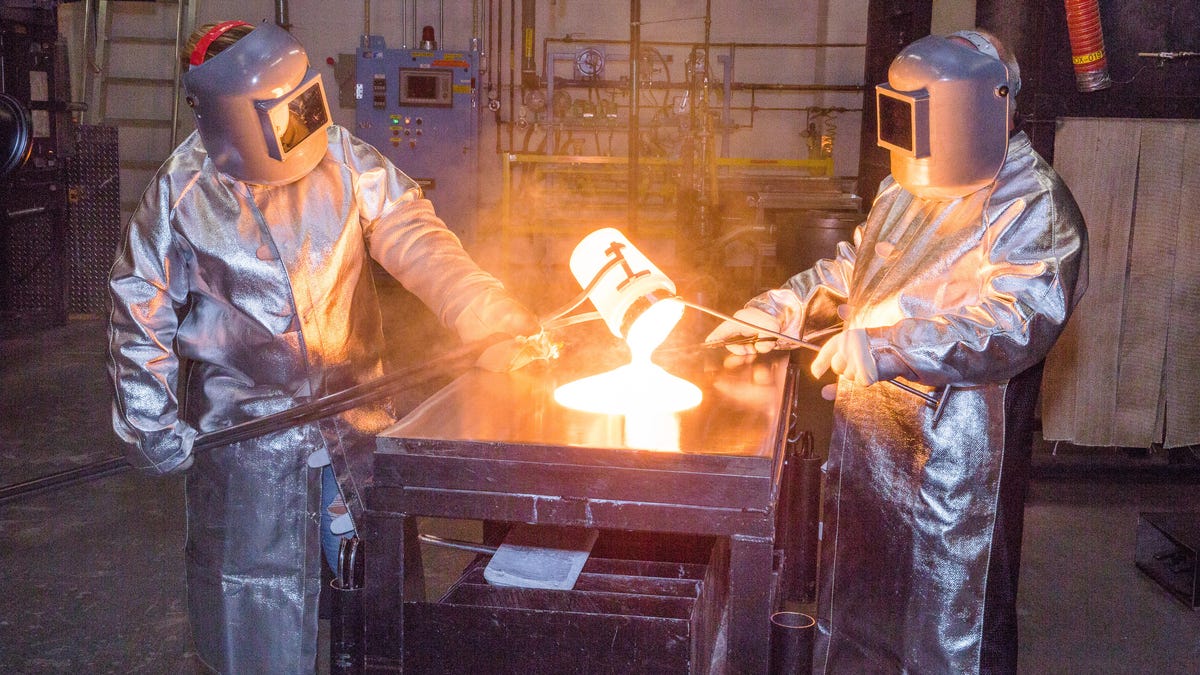Apple invests $250 million in Corning for future iPhone glass research
Corning has provided glass for every iPhone since the first in 2007. This is the second investment by Apple.

Corning has made the glass for every iPhone since the first in 2007. Here, glowing glass pours down like syrup onto a metal sheet at Corning's lab in upstate New York.
Apple's making another big investment in Corning to supercharge iPhone glass development.
The tech giant on Tuesday said it's giving Corning $250 million from its Advanced Manufacturing Fund, adding to the $200 million it invested two years ago. The money is meant to help with Corning's development of glass for the iPhone, Apple Watch and iPad, including "state-of-the-art glass processes, equipment and materials integral to the delivery of next-generation consumer devices," Apple said.
The latest iPhones -- the $699 iPhone 11, $999 11 Pro and $1,099 11 Pro Max -- use custom Corning glass that Apple boasts is "the toughest glass ever in a smartphone." The devices will be available in stores Friday.
"You can draw a straight line from the [funding] announcement in 2017 to [last week's] declaration on the iPhone and can figure out where that money was invested," John Bayne, head of Corning's Gorilla Glass business, said in an interview ahead of the funding announcement. The new $250 million investment will allow Corning to "double down," he said.
"We work very closely with Apple to understand what they're doing with products in the future ... and how we can support that," Bayne said. "This takes it to another level."
To consumers, Corning is probably best known for its Pyrex glassware in the kitchen. But it's also a major supplier of glass displays for smartphones, TVs and other electronics. Phones from Apple and Samsung use Corning's latest technologies, and since the initial launch of Gorilla Glass in 2007, over 7 billion devices have hit the market with it.
Apple-Corning partnership
Apple has used Corning's glass since the first iPhone. While Apple doesn't specify which type of glass it's using, its phones have tended to have glass custom-made by Corning. In its press release about the investment, Apple said "the newest iPhone models feature the toughest glass ever in a smartphone, as well as a back machined from a single piece of glass that allows for wireless charging."
Bayne declined to provide specifics about the glass used in the iPhone 11, 11 Pro and 11 Pro Max or compare it with the Gorilla Glass 6 that appears in devices like Samsung's Note 10. But he said Apple's investment from 2017 allowed Corning to "develop advanced manufacturing processes specific for Apple. ... This investment and glass is specific to Apple."
Apple's Advanced Manufacturing Fund, meanwhile, represents the company's commitment to invest billions in US companies to foster production and new jobs. It has spent the first $1 billion it promised and has already awarded 20% of the additional $5 billion it allocated for the fund. Corning became the first recipient of the fund in 2017, and Apple has committed $390 million to laser chipmaker Finisar and $10 million to the Elysis aluminum partnership.
The investment in Corning comes as Apple and other companies face criticism from President Donald Trump about building products overseas. While Apple designs its devices in Cupertino, California, it assembles gadgets like the iPhone in China. Tariffs on devices made in China -- including the iPhone -- are slated to start later this year.
Apple on Tuesday said it spent $60 billion with 9,000 American suppliers in 2018, supporting 450,000 jobs across all 50 states and manufacturing locations in 36 states. It noted that "every one of the company's core products -- from the iPhone and iPad to the Mac, Apple Watch and Apple TV -- contains parts or materials from the US or is made with equipment from US-based suppliers." The Corning glass used in iPhones is manufactured in Harrodsburg, Kentucky.
Bayne declined to specify what new glass Corning will develop for Apple but said its focus on four key areas hasn't changed over the years: making glass more scratch-resistant and drop-proof, improving optical properties and making it affordable.
When Apple built the first iPhone, it initially used plastic -- until it realized how much plastic scratched.
"When Steve Jobs took the first iPhone out of his pocket a couple days after announcing it, it was scratched," Bayne said. That caused the company to turn to Corning for glass, which it had to create for the phone's launch about six months later.
Along with continuing to focus on scratches, drops, optical clarity and affordability, Corning now is working on glass that doesn't show fingerprints, can bend for flexible phones and won't shatter when dropped, Bayne said.
While he can't say when glass will become break-proof, Bayne predicated that in a year or two, glass will be used in foldable phones. The first models from companies like Samsung and Huawei use plastic, which has problems with wireless charging, scratches easily and has other issues.

